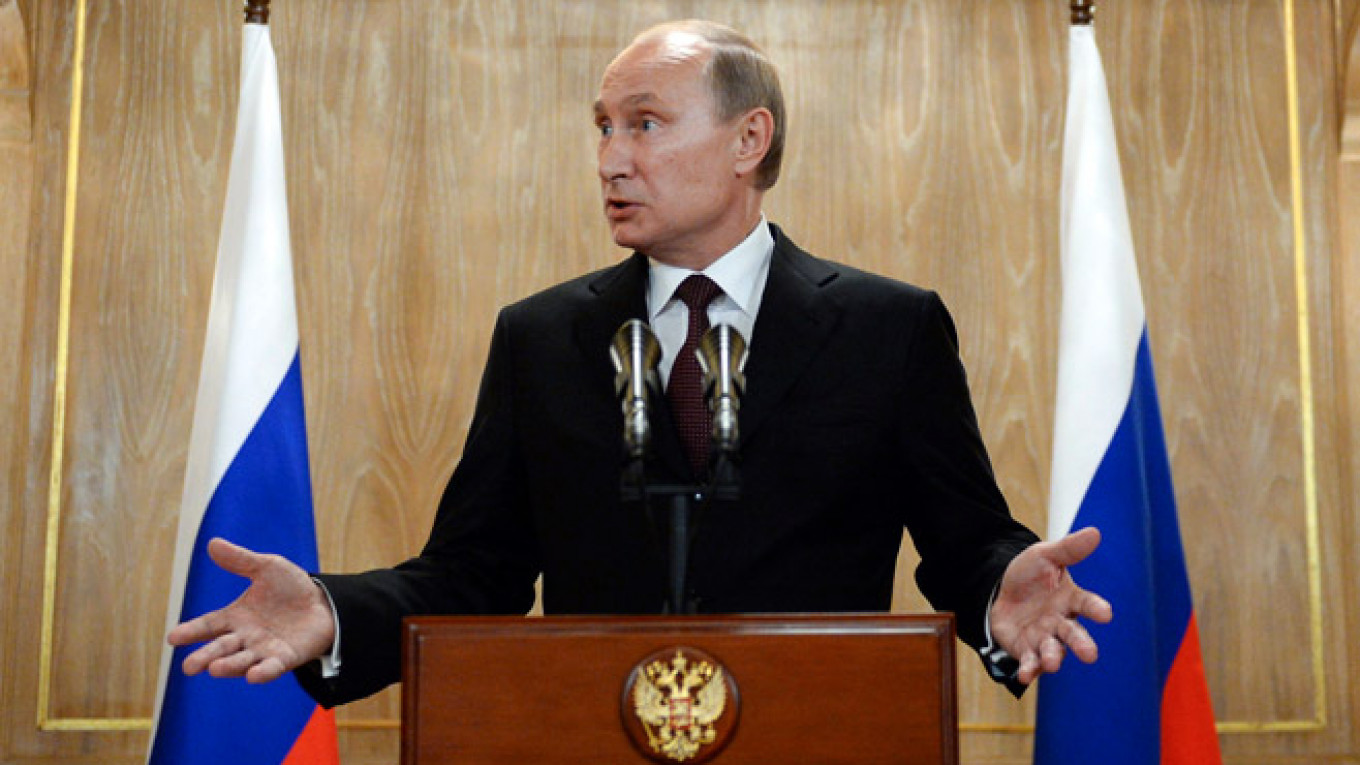Dear Mr. Putin,
On Thursday morning, your government dispatched at least six of its immigration agents to disrupt an investigative reporting workshop that a colleague and I were conducting at a hotel in your hometown of St. Petersburg. Among our "subversive" topics: how to be fair and balanced, ethical and thorough, and how to use data to be more precise and accurate.
That's what I, as executive director of the New England Center for Investigative Reporting, have taught to journalists in China, Serbia, Vietnam and other countries without interruption by government agents. My colleague there, Randy Covington, was the moderator of the workshop attended by 14 journalists. I was the main presenter.
Your agents began their inquiry with a simple request: "Your passports please." That was followed by an hour of questioning in a hotel meeting room. I was surrounded by your immigration law enforcers — one on each side of me and a few more standing guard at the door.
The agents peppered us with questions. Why are you in Russia? What are you doing here? Were you conducting a workshop? And then the order: "Write your statement, sign it, and we'll let you go." We did, but five minutes later, back in the workshop conference room, scene two of your Cold War movie unfolded.
The agents interrupted us again. "You need to come with us," they commanded in Russian. The van ride downtown, the stark, institutional waiting room. We were detained for three hours there at the immigration service before being transported to a district court. In the interest of fairness, I should note that your immigration service posted our names and the charges against us on its website while we were being detained.
When a Russian television crew unexpectedly arrived to interview us, your agents offered us tea and cookies. But those same agents tried to convince us to sign a statement admitting that we had violated immigration laws by being in Russia on what's called a "targeted tourism" visa while conducting a workshop. We refused to sign. The ride to the courthouse was a short but unsettling one. In the van, it was just Randy and I and several of your agents. We entered the courtroom after an hour or two of waiting.
We were given the opportunity to testify that we never had intended to violate the law and that the U.S. Embassy in Moscow had advised us that a "targeted tourism" visa was all we needed to conduct a workshop in your country. Randy explained to the judge that he had been in Russia just three months ago on a similar visa conducting a social media workshop without interruption. None of that made a difference.
The judge declared us both guilty of violating Russian immigration laws. We were relieved to learn that this was an administrative and not a criminal violation. The end result: a warning. Don't do this again, and leave the country on your scheduled flight.
Mr. Putin: Was all that really necessary? It's clear that you enjoy playing the tough guy on the world stage and that the Russian people overwhelmingly support your message to the rest of us: Russia is strong and will exercise her will as she sees fit.
I am part of a generation of Americans who grew up worrying that one of your country's unpredictable leaders would press the red button and blow us to smithereens. We thought — prematurely — that was all past us when the Soviet Union crumbled and a new Russia emerged. But now many in our country define Russia with a cliche: once a bully, always a bully. And you appear to like it that way.
Joe Bergantino is the executive director of the New England Center for Investigative Reporting, a nonprofit online news outlet based at Boston University and at WGBH News. A version of this op-ed appeared on BostonGlobe.com. The full letter is at? www.necir.org.
A Message from The Moscow Times:
Dear readers,
We are facing unprecedented challenges. Russia's Prosecutor General's Office has designated The Moscow Times as an "undesirable" organization, criminalizing our work and putting our staff at risk of prosecution. This follows our earlier unjust labeling as a "foreign agent."
These actions are direct attempts to silence independent journalism in Russia. The authorities claim our work "discredits the decisions of the Russian leadership." We see things differently: we strive to provide accurate, unbiased reporting on Russia.
We, the journalists of The Moscow Times, refuse to be silenced. But to continue our work, we need your help.
Your support, no matter how small, makes a world of difference. If you can, please support us monthly starting from just $2. It's quick to set up, and every contribution makes a significant impact.
By supporting The Moscow Times, you're defending open, independent journalism in the face of repression. Thank you for standing with us.
Remind me later.


